PyMsOfa: A Python Package for the Standards of Fundamental Astronomy(SOFA) Service
Jianghui Ji, Dongjie Tan, Chunhui Bao, Xiumin Huang, Shoucun Hu, Yao Dong, and Su Wang,3
1 CAS Key Laboratory of Planetary Sciences, Purple Mountain Observatory, Chinese Academy of Sciences, Nanjing 210023, China; jijh@pmo.ac.cn 2 School of Astronomy and Space Science, University of Science and Technology of China, Hefei 230026, China 3 CAS Center for Excellence in Comparative Planetology, Hefei 230026, China Received 2023 September 12; revised 2023 October 12; accepted 2023 October 16; published 2023 November 15
Abstract The Standards of Fundamental Astronomy (SOFA) is a service provided by the International Astronomical Union that offers algorithms and software for astronomical calculations,which was released in two versions for FORTRAN 77 and ANSI C,respectively.In this work,we implement the Python package PyMsOfa for SOFA service by three ways:(1) a Python wrapper package based on a foreign function library for Python(ctypes), (2)a Python wrapper package with the foreign function interface for Python calling C code(cffi)and(3)a Python package directly written in pure Python codes from SOFA subroutines.The package PyMsOfa has fully implemented 247 functions of the original SOFA routines released on 2023 October 11.In addition,PyMsOfa is also extensively examined,which is exactly consistent with those test examples given by the original SOFA.This Python package can be suitable to not only the astrometric detection of habitable planets from the Closeby Habitable Exoplanet Survey mission, but also for the frontier themes of black holes and dark matter related to astrometric calculations and other fields.The source codes are available via http://pypi.org/project/PyMsOfa/ and https://github.com/CHES2023/PyMsOfa.
Key words: Astrometry and Celestial Mechanics – planets and satellites: detection – planets and satellites:terrestrial planets
1.Introduction
The Standards of Fundamental Astronomy (SOFA)4http://www.iausofa.org/index.htmlservice was established by the International Astronomical Union(IAU), which is an algorithm and program based on the fundamental astronomical models that aim to implement the IAU resolutions in an authoritative program.The SOFA service contains the implementation of the time system, the transformation of the coordinate system and the attitude of the Earth (e.g., the precession and nutation, closely related to International Earth Rotation Service), and astrometric parameters.The routines were well written in strict compliance with IAU resolutions and have been updated as the resolutions were amended, with the latest version released on 2023 October 11.
The SOFA service is officially released in two programming languages, i.e., FORTRAN 77 and ANSI C, whose advantages of high efficiency and fast running make them widely utilized in scientific computations.However, the Python language greatly benefits from its easy-to-learn, simple syntax, and tremendous built-in libraries in science and engineering,which motivates us to implement the full Python package PyMsOfa5https://pypi.org/project/PyMsOfa/,6https://github.com/CHES2023/PyMsOfafor SOFA,leading to direct, convenient and efficient routines being available.
There are several Python packages that contain SOFA features, such as Astropy,7https://docs.astropy.org/en/stable/index.htmlPyERFA,8https://github.com/liberfa/pyerfa, https://doi.org/10.5281/zenodo.3940699and pysofa9https://pypi.org/project/pysofa(which contains only 186 subroutines from 247 SOFA service).However, in this work, the Python package is a complete implementation of all 247 functions of a recently released SOFA version in three ways via Python, i.e., wrapped with the ctypes library and the cffi interface,and written directly in pure Python codes based on SOFA subroutines.Thus the users of SOFA with FORTRAN 77 and ANSI C version can easily get started with this Python package,and achieve similar goals in the study.
The paper is organized as follows: in Section 2 we briefly describe several major modules that SOFA service can achieve.Section 3 describes the features of the Python package and presents two examples of astrometric calculations.Finally, we make a concise summary in Section 4.
2.Functions in the SOFA Service
The routines of the SOFA service can be divided into four categories: basic calculation module, timescale and calendar module, coordinate system transformation module, and Earth attitude module.Each consists of dozens of routines.A briefintroduction of these routines and functions is provided below.More detailed descriptions can be found in the comments and SOFA documentation.

Table 1 The Timescales Involved in SOFA Service
2.1.Basic Calculation Module
Such routines are very basic, mainly involving the processing of parameters, vectors and matrices.Its purpose is to conduct the calling between SOFA routines, so it does not fully include all vector and matrix operations.Similar functionality can be implemented in many other packages.
These routines can realize the conversion of coordinates,such as the conversion between spherical coordinates to Cartesian ones (e.g., pymS2c and pymC2s).The routines about vectors perform the processing of velocity—position vectors that are required in other programs(e.g.,pymTrxpv and pymPvu).For matrices,they contain functions such as rotation of a matrix (e.g., pymRx).In addition, the SOFA service also provides procedures for projective relations (e.g., pymTpxes),involving the conversion between spheres and planes.
2.2.Timescale and Calendar Module
The timescales involved in the SOFA service are shown in Table 1.Each timescale has a different use,and there is a slight time difference between them (Moyer 1981; Fairhead &Bretagnon 1990; Müller & Jappel 2012).Some of the timescales have a linear relationship, while others have to be transformed according to the location(Seidelmann 1992;Soffel et al.2003; McCarthy & Petit 2004).Figure 1 illustrates the functions involved in the conversion between timescales.In addition,the discontinuity of time caused by leap seconds also needs to be taken into account (e.g., pymDat) (Seidelmann 1992).Therefore, when performing astronomical scientific calculations,it is necessary to choose an appropriate timescale.
The Julian Date is an astronomical method that measures time over a long time span, which is widely adopted in the definition of a calendar.In the SOFA service,the Julian Date is described by two parameters, for a specific calendar of Julian Day JD = 2450123.7, the date can be denoted as JD1=2400000.5 and JD2=50123.2, respectively.
2.3.Coordinate System Transformation Module
The SOFA service include the conversion of different coordinate systems, such as geodetic coordinate, geocentric coordinate, horizon coordinate, hour angle system of coordinate, ICRS, ecliptic coordinate and galactic coordinate.The package provides a complete system for the astrometric parameters, ASTROM, which is composed of 30 components.These components include the time, solar system barycenter(SSB) to the observer, direction and distance relative to the Sun,barycentric observer velocity,reciprocal of Lorenz factor,bias-precession-nutation matrix,Terrestrial Intermediate Origin(TIO)locator(McCarthy&Petit 2004),polar motion,geodetic latitude,diurnal aberration(Klioner 2003),Earth rotation angle and refraction constants A and B (Crane 1976; Rüeger 2002).Detailed calculation procedures are also provided for each component.The final ASTROM parameters are the astrometric parameters of different stations, independent of stars.Table 2 lists several major basic coordinate systems involved in SOFA service, while Table 3 displays the functions that produce the components of ASTROM and the functions used to transform the stellar parameters.
SOFA service also deals with the transitions between FK4,FK5 and the Hipparcos catalog (e.g., pymFk425, pymFk524 and pymFk5hip)(Aoki et al.1983;Yallop et al.1989;Mignard& Froeschlé 2000).These coordinate systems cover the fundamental coordinate systems in classical astrometry.In astronomical calculation, the change of coordinate system is inseparable from the change of position of the observation target to various observation stations(Green 1962).The SOFA service here gives a set of authoritative algorithms.
In addition to this, the SOFA service still provides the transformation of star positions between FK4, FK5 and the Hipparcos catalog.
2.4.Earth Attitude Module
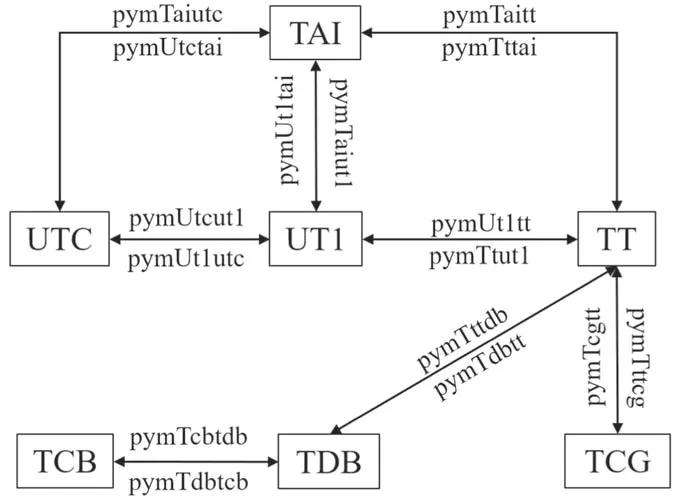
Figure 1.The functions involved in the conversion between the timescales in Table 1.
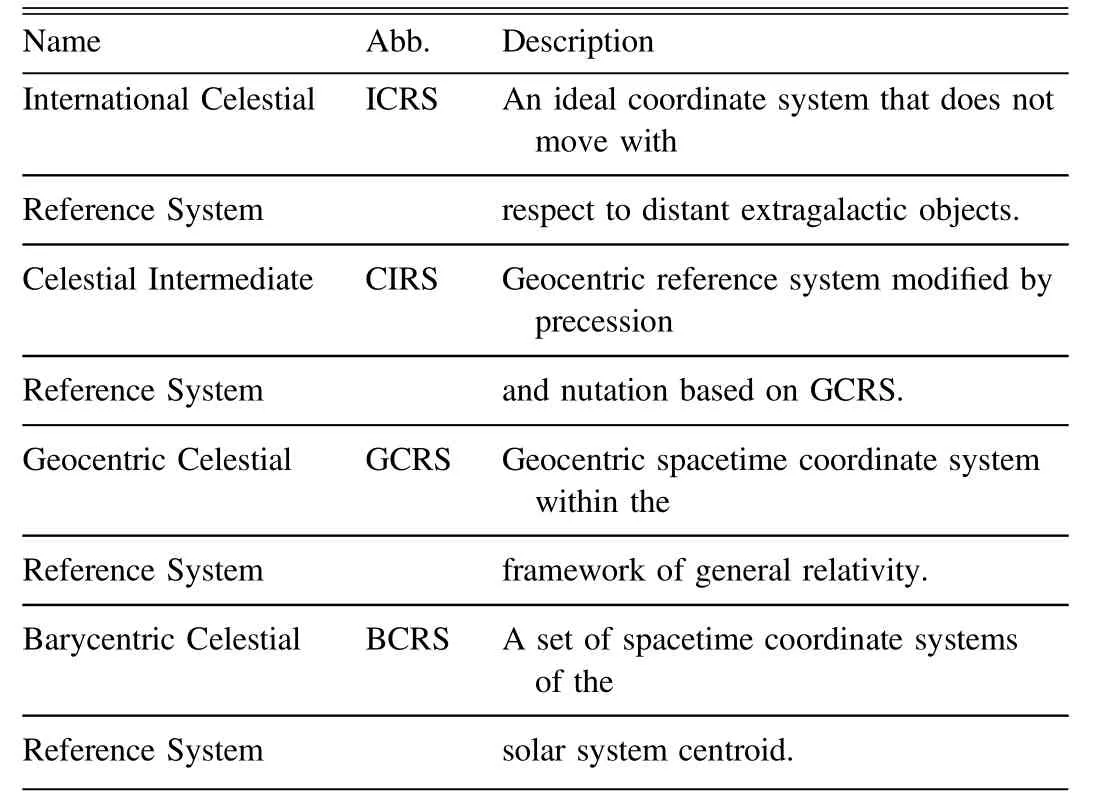
Table 2 The Fundamental Coordinate Systems Involved in SOFA Service
The SOFA service supplies an authoritative definition of the parameters involved in the Earth attitude and provides detailed algorithms.These parameters include the parameters of the objects in the solar system (e.g., the mean longitude of the planets and their approximate heliocentric positions and velocities, e.g., pymPlan94) (Simon et al.1994; Klioner 2003), bias-precession-nutation matrix (Lieske 1979; Mathews et al.2002; Wallace & Capitaine 2006), Earth rotation angle(Capitaine et al.2000), celestial intermediate pole (CIP),celestial intermediate origin (CIO) (Capitaine et al.2003a,2003b; Capitaine & Wallace 2006), etc.(e.g., pymPn00 and pymNum06a).There are some differences in these parameters under different models, so SOFA also gives the parameters under the IAU 1976 model (Lieske et al.1977), IAU 1980 model(Seidelmann 1982),IAU 2000 A&B model(Soffel et al.2003) and IAU 2006 model (Seidelmann et al.2007).The calculations of the routines are also consistent with those in the IAU resolution (Wallace & Capitaine 2006).Thus one can choose the required models and parameters with respect to different astronomical calculations.
3.Python Feature of the Package
For simplicity, here this Python package of the SOFA service is described based on the ctypes library, which is a foreign function library for Python that provides C compatible data types, and allows calling functions in the shared libraries.10The cffi interface version and pure Python codes are also available via the GitHub website.We integrated all 247 functions in a C file from the SOFA package, which is named sofa_a.c.A dynamic shared library file (libsofa_c.so) was compiled from three source files (sofa.h, sofam.h and sofa_a.c).By calling the shared library file and the ctypes library,we establish a Python interface for each SOFA function under ANSI C, thus SOFA service can be employed directly in Python programs.The codes are accessible at https://github.com/CHES2023/PyMsOfa and http://pypi.org/project/PyMsOfa/.
This Python package differs from the ANSI C version in that the parameters involved in its functions vary in addition to the language used.In the original ANSI C version by SOFA, the input and output parameters of the function are included in the parameters of the calling function.In the Python version, the parameters of the function refer only to those input parameters.In addition,the parameters involved in each function,along with their types,units,etc.,are briefly given in their comments.It can be easily queried when using each function by the package in the Python environment.In the following, we will show two applications for the usage of the Python package for SOFA.
For the Closeby Habitable Exoplanet Survey (CHES) (Ji et al.2022), a number of functions in the SOFA service are employed to simulate the observed images.Here we present two examples (see Figures 2 and 3).The first example illustrates the time expression in SOFA service as mentioned previously in that the time is usually expressed by two parameters.The given two examples can accurately calculate the coordinates of the target star and reference stars based on the Gaia Data Release 3 (DR3), respectively, at the time of observation (on the plane).From the projection theorem, the coordinates in the focal plane are given to calculate the major observed quantity in the CHES mission, i.e., the angular distance between them in the focal plane.Such functions can further provide references to relevant parameters in the CHES mission (Ji et al.2022; Tan et al.2022).Figure 4 shows a simulation image with the above-mentioned two functions(pymPmsafe,pymTpxes),which is in good agreement with the produced image from ESASky.
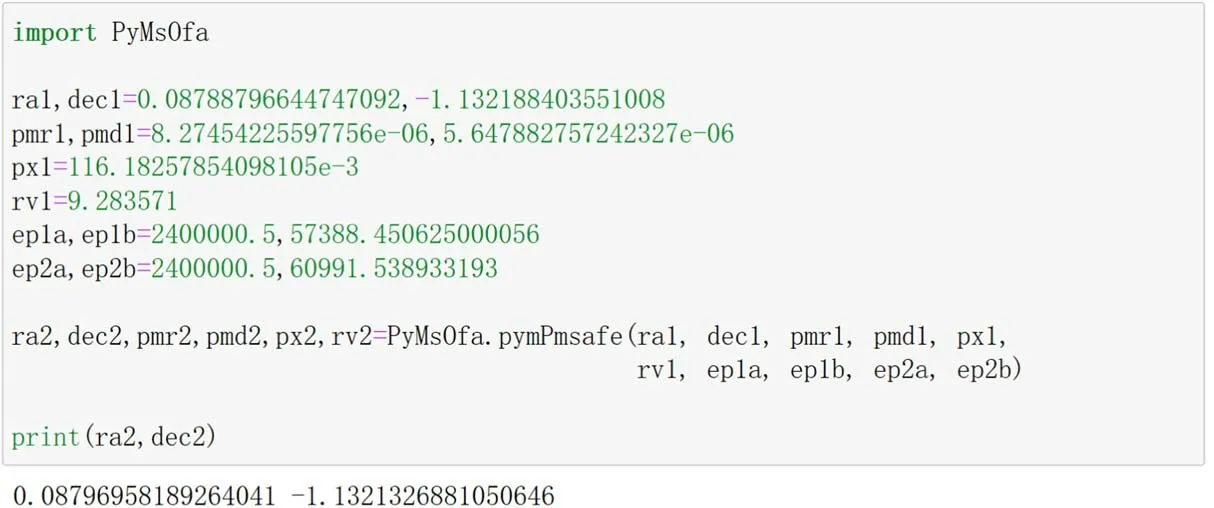
Figure 2.pymPmsafe: Example for the calculation of the R.A.and decl.at the given epoch.

Figure 3.pymTpxes: Example for the calculation of rectangular coordinates on the focal plane.

Table 3 The Transformation between Basic Coordinate Systems
In addition to the detection of exoplanets, this package is also available for various astrometric observations, such as the detection of black holes, dark matter, etc.Figure 5 reproduces the prediction of the motion of the star orbiting a black hole using PyMsOfa.The orbital parameters in the simulations are adopted from El-Badry et al.(2023).Using this Python package, the proper motion and parallax of the star can be carefully processed to achieve an accurate orbital motion under the gravitation from a black hole (Figure 5).This will contribute to a more detailed investigation and analysis of the physical properties of black holes.
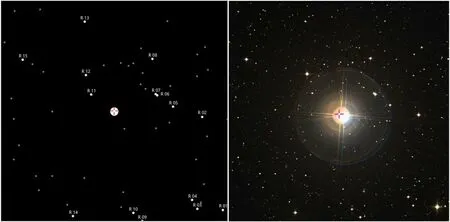
Figure 4.Left panel: The simulation image of the target star (* zet Tuc) in the CHES mission.The positions of the stars are based on the data from Gaia DR3 and converted to the predetermined observation time(JD2460992.04)and observation position(L2)by the relevant function in PyMsOfa.Right panel:The image of the same field of view obtained from ESASky.
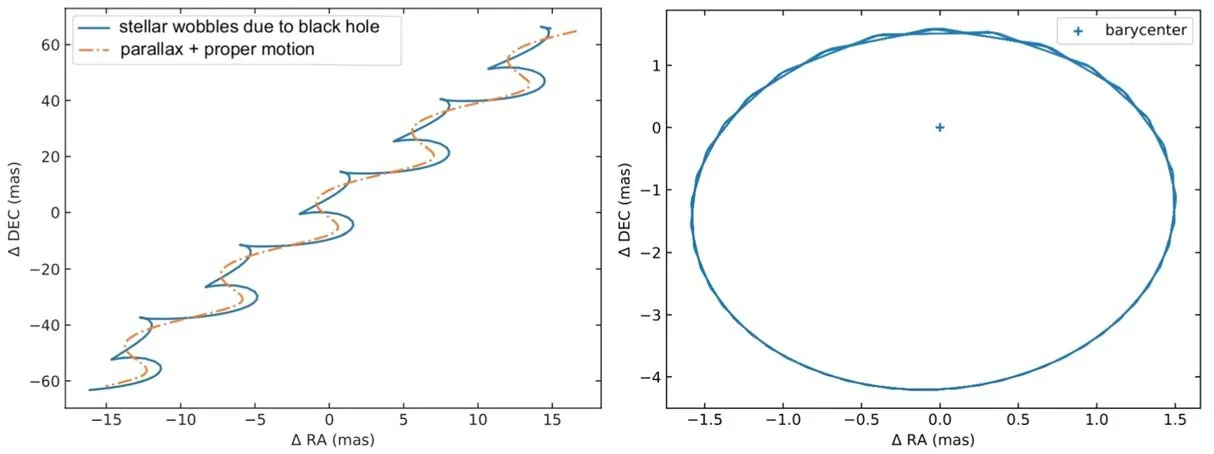
Figure 5.The predicted motion of Gaia BH1ʼs photocenter on the sky during 5 yr.Left panel:The total motion due to proper motion,parallax and orbital motion.The dash–dotted line isolates the contribution due to parallax and proper motion alone.Right panel:The predicted orbital motion,with parallax and proper motion removed.
4.Summary
In this work we describe the functionality of the Python package PyMsOfa for SOFA service in three ways:(1)a Python wrapper package based on ctypes library,(2)a Python wrapper package with the cffi interface and(3)a Python package directly written in pure codes from SOFA algorithms.They implement SOFA service in a Python interface in various ways but each package can have the same usage.The purpose of this work is to enable a wide variety of usages of the authoritative algorithms in the SOFA service with the Python interface.The Python package has fulfilled the necessary requirements all 247 functions of SOFA service written in ANSI C,containing basic calculation, timescale and calendar, coordinate system transformation, Earth attitude and astrometric parameters.This Python package is thoroughly and correctly tested with those original examples given by SOFA,which runs stably on Linux,macOS and Windows operating systems.
Astrometry is an ancient branch of astronomy, which primarily aims at the investigation of the positions of celestial bodies.With quick development,astrometry can supply a clear understanding from the solar system to the entire universe on the basis of ground-based and space-based observations.Nowadays, with improvement in the accuracy of astrometry,besides direct measurements of stellar positions and velocities,indirect measurements can be extensively conducted to provide vital implications for the frontier themes of habitable planets,black holes, dark matter, etc.The SOFA service integrates the basic theory of astrometry and is a convenient tool to conduct astrometric related calculations and can be applied to diverse research fields.This Python package was originally intended to facilitate the use of SOFA service for various astronomical calculations.Thanks to the excellent, comprehensive features of SOFA service, this package can also be further used for related astronomical calculations in Python.
Acknowledgments
This work is financially supported by the National Natural Science Foundation of China (NSFC, Grant Nos.12033010,11773081 and 12111530175), the Strategic Priority Research Program on Space Science of the Chinese Academy of Sciences (grant No.XDA 15020800), and the Foundation of Minor Planets of the Purple Mountain Observatory.
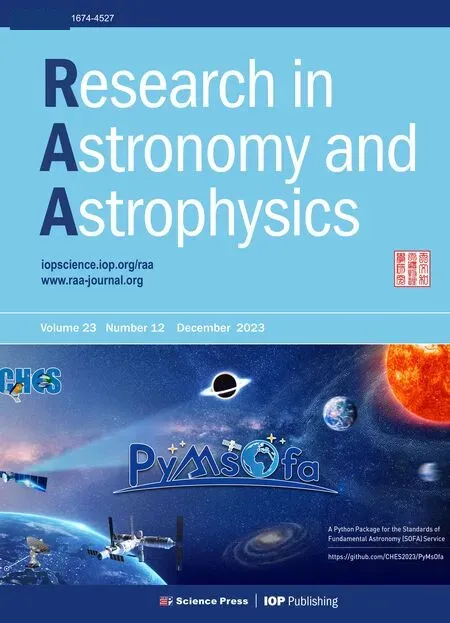 Research in Astronomy and Astrophysics2023年12期
Research in Astronomy and Astrophysics2023年12期
- Research in Astronomy and Astrophysics的其它文章
- Large-scale Dynamics of Line-driven Winds with the Re-radiation Effect
- A Study of Elemental Abundance Pattern of the r-II Star HD 222925
- Preliminary Study of Photometric Redshifts Based on the Wide Field Survey Telescope
- Solar Observation with the Fourier Transform Spectrometer.II.Preliminary Results of Solar Spectrum near the CO 4.66μm and MgI 12.32μm
- Density Functional Theory Calculations on the Interstellar Formation of Biomolecules
- Detection Capability Evaluation of Lunar Mineralogical Spectrometer:Results from Ground Experimental Data
